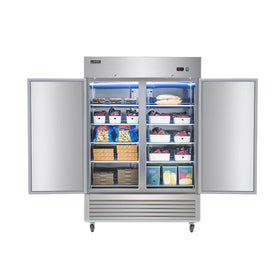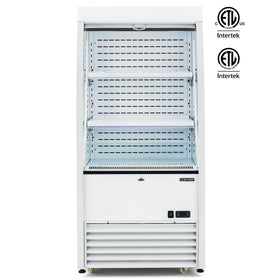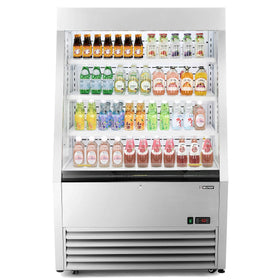Running a commercial kitchen isn’t just about consistently turning out delicious food. It’s about preparing food that is always delicious but safe to eat every single time.
The importance of food safety cannot be emphasized enough, especially in a commercial kitchen. One bad refrigeration system can mean spoiled food, sick customers, legal nightmares, and a reputation that might not recover.
This is why UL certification is so important to commercial kitchens, especially for something as essential as your commercial refrigerator.
For owners and managers (or prospective owners and managers) of commercial kitchens, here’s why food safety matters, the real risks involved, and how a UL-certified refrigerator can be one of your best tools to keep everything (and everyone) safe.
Food Safety Risks and Why You Don’t Want Them
The biggest food safety hazards in any kitchen are all related to temperature abuse. Temperature abuse happens when perishable foods like meat, dairy, seafood, and cooked items are stored or held at unsafe temperatures, and they get infected with bacteria.
It is important to know the ideal temperature to store food items in a commercial refrigerator. The danger zone (the temperature range in which foodborne bacteria can grow) is between 40°F and 140°F, and bacteria like E. coli, Salmonella, and Listeria thrive there. Just a couple of hours in that zone is all it takes for bacteria to multiply to dangerous levels.
That means if your refrigerator isn’t working properly, or if temperatures fluctuate without anyone noticing, your food could be unsafe before you even realize there’s a problem.
That’s a disaster waiting to happen.

Other Minor (But Serious) Food Safety Risks
Aside from temperature abuse, which is the big one, there are a handful of smaller food safety risks that can add up to big problems in a commercial kitchen.
- Cross-contamination: When raw meat juices touch ready-to-eat foods or clean surfaces, it creates a direct path for bacteria to spread. This mostly happens if you do not know the right way to store items in a commercial refrigerator: what foods to place on the top shelf, and so on..
- Improper cleaning: If fridges and prep areas aren’t easy to sanitize or made from the wrong materials, grime and bacteria can build up in cracks or seams. Cleaning a commercial refrigerator is a must-have skill for anyone working in a commercial kitchen.
- Faulty seals or poor airflow: When a fridge door doesn't close tightly or air doesn't circulate properly, some areas can warm up without notice.
- Uncalibrated thermostats or sensors: If the temperature readout isn’t accurate, you might not know your fridge is out of the safe zone.
All of these issues can come from poorly designed or untested equipment.
Consequences of Poor Food Safety: Why You Need a UL-Certified Refrigerator
Poor food safety is a disaster for any commercial kitchen: it affects the health and safety of your paying customers, which can in turn shatter your business and get you in trouble with the law.
1. Poor Food Safety Hurts Your Customers
Let’s start with the most important consequence: people can get sick. In the US, an average of 3,000 deaths from foodborne diseases occur every year.
- Illness or hospitalization due to foodborne pathogens
- Vulnerable populations (children, the elderly, and immunocompromised) are at greater risk
- Possible death in severe outbreaks
Foodborne illness is not just a statistic; it could get real when your customer is in the ER, your regular has food poisoning, or a child has a dangerous infection.
2. Poor Food Safety Can Destroy Your Business
One outbreak is all it takes. Word gets out fast, especially with social media and online reviews. Your reputation can take a nosedive, and so can your revenue. Negative press, online reviews, and loss of customer trust
- Drop in revenue from public backlash
- Staff morale decline and potential turnover
Once staff morale drops, hiring gets harder, and you could even face a permanent shutdown.
3. Poor Food Safety Has Legal Consequences
You’re legally required to follow food safety regulations. Especially now that the FDA Food Safety Modernization Act (FSMA) is shifting the focus from responding to foodborne illness to preventing it, health departments are more likely to impose heavy fines and even lawsuits.
- Health department closures and failed inspections
- Fines and penalties from regulatory bodies
- Liability lawsuits from affected customers
- Loss of insurance or inability to renew policies
In severe cases, criminal negligence charges can be brought if customers are seriously harmed. That’s not a position any business wants to be in.
How a UL Certified Commercial Refrigerator Helps With Food Safety
UL certification isn’t just a stamp—it’s proof that a piece of equipment has passed rigorous, science-based safety and performance testing. For commercial kitchens, UL EPH (Environmental and Public Health) certification is especially important.
When customers see the UL Mark, the UL Leaf Mark, or the UL Verified Mark, they know your refrigeration unit has been tested to the standard, reducing the chances of food and medicine spoilage.
Here’s how a UL-certified refrigerator gives you a strong line of defense:
1. UL Certification Means Consistent, Reliable Temperature Control
UL tests ensure that the unit can hold safe temperatures consistently, even in high-demand, hot-kitchen environments. UL’s performance and quality testing ensures that the performance of a commercial refrigerator meets the market standards.
That means no surprise spike in temperature that might put your food in the danger zone. You can trust that your perishable inventory is protected 24/7, and your customers are eating safe food.
2. UL-Certification Means Sanitary, Food-Safe Construction
UL EPH certification means the fridge is built with non-toxic, food-safe, corrosion-resistant materials that are easy to clean. It ensures that the refrigerator is not made of porous plastics and does not have any hard-to-reach nooks where bacteria can hide.
With a UL-certified commercial refrigerator, daily cleaning and deep-sanitizing are simpler and more effective, and food safety risks are easy to sort out.
3. UL-Certified Commercial Refrigerators Ensure Better Compliance with Health Codes
UL-certified equipment helps you meet or exceed FDA Food Code standards, NSF/ANSI requirements, and local health department regulations. The “UL certified” mark has gained global recognition and acceptance with code authorities and customers.
That means the inspectors know the UL mark and trust it. That can make inspections less stressful and more predictable.
4. Electrical and Fire Safety Built In
In a busy kitchen, your fridge isn’t just about food safety—it’s also a piece of heavy-duty electrical equipment. UL tests for fire risks, electrical shorts, and overheating. UL’s comprehensive compliance services test and provide certification for gas and combustion, safety, performance, EMC, interoperability, cybersecurity, and sustainability.
A UL-certified commercial refrigerator keeps your team safer and reduces your liability.
5. Confidence You Can Count On
When a unit is UL certified, you know it's been independently verified to do what it claims. That’s peace of mind for you, your team, your insurance company, and your customers.
Bottom Line: Is Your Commercial Refrigerator UL-Certified?
You can’t cut corners on food safety, and the right equipment plays a huge role. A UL-certified commercial refrigerator helps you avoid temperature-related risks, reduce contamination, stay compliant, and protect both your customers and your business.
In a high-pressure kitchen where every second and every slice of product counts, UL certification isn’t just a nice-to-have. It’s a safety net you can build your reputation on.
You Might Be Interested in
Why you should choose a UL-certified commercial refrigerator.












